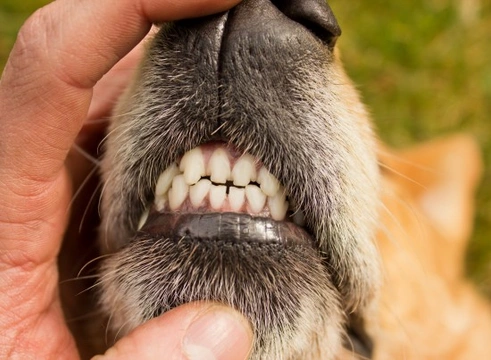
Some Home Dental Care Tips & Tricks for Dogs
Prevention is better than cure!
Unfortunately, plaque (a soft film of bacteria and food particles) can very quickly turn to tartar (within 4-5 days) and whilst plaque is quite easy to remove by careful brushing, the hard yellow tartar can only be removed by your vet. The key is to try to stop the accumulation of plaque and ensure its removal before the tartar can develop. Please do bear in mind that some dogs are genetically predisposed to dental disease, and unfortunately may develop problems despite regular home dental care.
Can crunching on dry food really help?
Crunching on some brands of dry food can be advantageous to a degree, but benefits are often exaggerated. Anything that your dog eats can result in the accumulation of residual material in the mouth that can lead to plaque and tartar.
Can raw meaty bones help?
There is much anecdotal evidence from raw feeders that recreational bones help promote clean healthy teeth, but not all owners are comfortable with them. It’s imperative the bone size and density is suitable for the individual dog otherwise there is a risk of fractured teeth. Bones should never be cooked, and always given under close supervision. There are other risks including those associated with hygiene, splintering and impaction.
Natural Antioxidants
One reason that some commercial brands of dog food are marketed as orally friendly is because of the inclusion of antioxidants. Antioxidants are most commonly known as food preservatives (to help prevent the fat content from becoming rancid) and as protectors against the potentially harmful effects of free radicals in the body; but they are also used in dental practice for benign diseases or premalignant lesions. Recent years have shown the presence of free radicals in causation and progression of various dental diseases and antioxidant usage in dental therapeutics.
There are many sources of antioxidants that may be found in commercial pet food including certain vitamins, minerals and plant extracts. Vitamin C is anantioxidant vitamin which has many functions. In terms oforal care, ithelps the lining of the gums (epithelium) stay healthy despite the bacteria that inhabit the mouth. Healthy gums isolate the bacteria from the roots of the teeth despite their close proximity.
When bacteria start to penetrate the gums, through tiny lesions or weakened lining, it is within the gums that the immune system fights to eradicate the harmful bacteria and to ensure the health of both the gums as well as the underlying tooth-supporting ligaments and bone. Bioflavonoids are thought to significantly enhance the absorption of Vitamin C, and possibly to prolong the effectiveness when they are combined together and also contain active substances which inhibit the enzymes which enable the oral bacteria to stick to the teeth.
Carrots provide a good natural source of vitamin C and are popular with many dogs and their owners.
Sugar
Dogs and cats are not prone to tooth decay in the same way as humans, but it does make sense to avoid sticky, sugary foods because even if these are not directly responsible for problems in our pets, they still act as a food source and growth medium for the harmful bacteria.
Brushing
The most effective way to keep the teeth clean is with a soft toothbrush (made for pets or toddlers) and a special toothpaste (human tooth paste should never be used).Not all dogs are amenable to this, and unless they have been accustomed to it from an early age, it can be hard to get them to accept it.If you are patient, it’s possible by letting your dog first lick the paste from your finger to get him used to the taste. Next you can start gently rubbing the teeth with a finger (be careful not to get nipped in the process), next move to a finger stall to apply the paste; after which time you can graduate to a brush.
Enzymatic Paste & Toys
For dogs who detest the tooth brush, an enzymatic paste (that stops the soft plaque turning to hard tartar) can be smeared on to a grooved dental toy. The mechanical action of chewing helps to clean the teeth. It can also be applied to knotted rope toys, and a good game of tug of war almost has a dental floss type action. It's messy though so best played outdoors!
Plaque Off
Proden produce a patented seaweed supplement (Proden Plaque Off) which is popular and easy to use. Clinical trials have demonstrated that the regular use of this specific seaweed is effective in helping to reduce plaque and calculus. The advantage of a product like this is that it is free from artificial colourings, preservatives and gluten. It’s also low in calories. Most commercial dental chews for dogs are not hypoallergenic and may not be suitable for dogs with food allergies or intolerance particularly if they contain unspecified meat and cereal derivatives.
Important Note: Plaque Off does contain iodine, so may not be suitable for animals undergoing thyroid treatment. It is also not recommended for pregnant or lactating bitches.
Dental Chews
Dental chews are indeed very popular, but as mentioned, they can be disadvantageous for dogs who are either allergic or intolerant to one or more of the ingredients they contain, or those who are weight watching. Some owners opt for antlers for their dogs, but like bones, there is a risk of fractured teeth (particularly if the size and density isn’t suitable for the individual).



